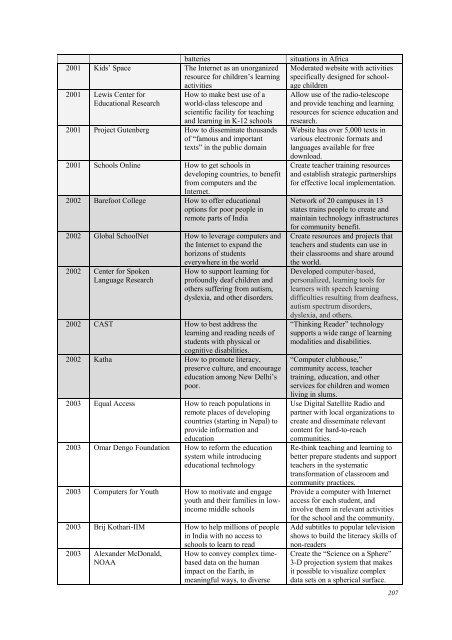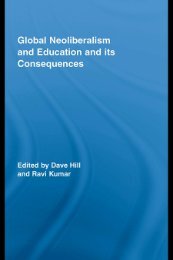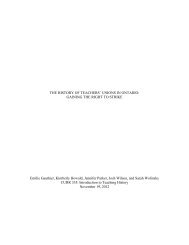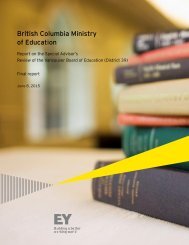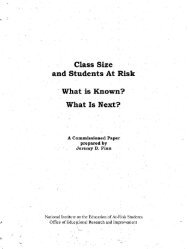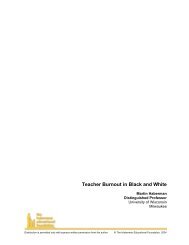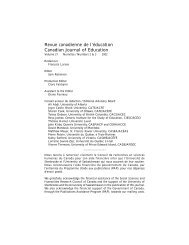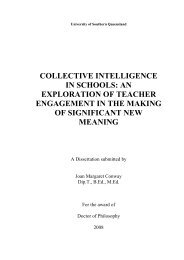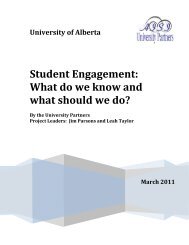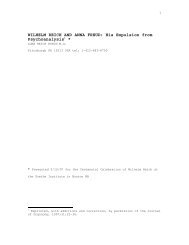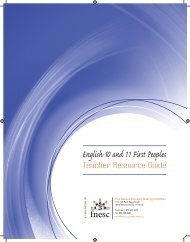October 2006 Volume 9 Number 4
October 2006 Volume 9 Number 4
October 2006 Volume 9 Number 4
You also want an ePaper? Increase the reach of your titles
YUMPU automatically turns print PDFs into web optimized ePapers that Google loves.
atteries situations in Africa<br />
2001 Kids’ Space The Internet as an unorganized<br />
resource for children’s learning<br />
2001 Lewis Center for<br />
Educational Research<br />
activities<br />
How to make best use of a<br />
world-class telescope and<br />
scientific facility for teaching<br />
and learning in K-12 schools<br />
2001 Project Gutenberg How to disseminate thousands<br />
of “famous and important<br />
texts” in the public domain<br />
2001 Schools Online How to get schools in<br />
developing countries, to benefit<br />
from computers and the<br />
Internet.<br />
2002 Barefoot College How to offer educational<br />
options for poor people in<br />
remote parts of India<br />
2002 Global SchoolNet How to leverage computers and<br />
the Internet to expand the<br />
horizons of students<br />
2002 Center for Spoken<br />
Language Research<br />
everywhere in the world<br />
How to support learning for<br />
profoundly deaf children and<br />
others suffering from autism,<br />
dyslexia, and other disorders.<br />
2002 CAST How to best address the<br />
learning and reading needs of<br />
students with physical or<br />
cognitive disabilities.<br />
2002 Katha How to promote literacy,<br />
preserve culture, and encourage<br />
education among New Delhi’s<br />
poor.<br />
2003 Equal Access How to reach populations in<br />
remote places of developing<br />
countries (starting in Nepal) to<br />
provide information and<br />
education<br />
2003 Omar Dengo Foundation How to reform the education<br />
system while introducing<br />
educational technology<br />
2003 Computers for Youth How to motivate and engage<br />
youth and their families in lowincome<br />
middle schools<br />
2003 Brij Kothari-IIM How to help millions of people<br />
in India with no access to<br />
2003 Alexander McDonald,<br />
NOAA<br />
schools to learn to read<br />
How to convey complex timebased<br />
data on the human<br />
impact on the Earth, in<br />
meaningful ways, to diverse<br />
Moderated website with activities<br />
specifically designed for school-<br />
age children<br />
Allow use of the radio-telescope<br />
and provide teaching and learning<br />
resources for science education and<br />
research.<br />
Website has over 5,000 texts in<br />
various electronic formats and<br />
languages available for free<br />
download.<br />
Create teacher training resources<br />
and establish strategic partnerships<br />
for effective local implementation.<br />
Network of 20 campuses in 13<br />
states trains people to create and<br />
maintain technology infrastructures<br />
for community benefit.<br />
Create resources and projects that<br />
teachers and students can use in<br />
their classrooms and share around<br />
the world.<br />
Developed computer-based,<br />
personalized, learning tools for<br />
learners with speech learning<br />
difficulties resulting from deafness,<br />
autism spectrum disorders,<br />
dyslexia, and others.<br />
“Thinking Reader” technology<br />
supports a wide range of learning<br />
modalities and disabilities.<br />
“Computer clubhouse,”<br />
community access, teacher<br />
training, education, and other<br />
services for children and women<br />
living in slums.<br />
Use Digital Satellite Radio and<br />
partner with local organizations to<br />
create and disseminate relevant<br />
content for hard-to-reach<br />
communities.<br />
Re-think teaching and learning to<br />
better prepare students and support<br />
teachers in the systematic<br />
transformation of classroom and<br />
community practices.<br />
Provide a computer with Internet<br />
access for each student, and<br />
involve them in relevant activities<br />
for the school and the community.<br />
Add subtitles to popular television<br />
shows to build the literacy skills of<br />
non-readers<br />
Create the “Science on a Sphere”<br />
3-D projection system that makes<br />
it possible to visualize complex<br />
data sets on a spherical surface.<br />
207


